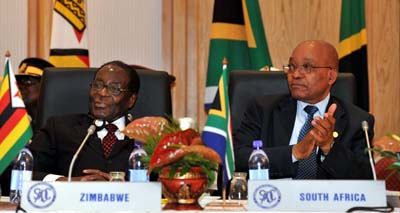As heads of state gathered last week at the summit of the Southern African Development Community, or SADC, in Namibia, their discussions were dominated by the progress of Zimbabwe‘s precarious power-sharing political agreement, which includes pledges to address a repressive media environment. Leading the mediation in the Zimbabwean crisis has been neighboring South Africa, which has been seen as a one-eyed man among the blind in terms of democracy and press freedom in Southern Africa. Yet the moral authority of South African president Jacob Zuma in Zimbabwe’s situation is undermined by proposals of his African National Congress-led government to restrict the vibrant press in South Africa.
In the name of allowing average citizens to hold the media accountable, Zuma’s ANC has proposed the setup a special media tribunal, accountable to parliament (where close to two-thirds of the seats are filled by ANC politicians) to monitor and sanction the press. The ANC-led government has also put forward the Protection of Information Bill as a measure to curb uncontrolled reporting of internal state information. Journalists reporting official information the state deems classified could face as many as 25 years in prison.
These measures follow press revelations of public corruption and maladministration implicating ANC officials. Under the proposed bill, information contained in the opposition Democratic Alliance’s Wasteful Expenditure Monitor, which exposed how ANC officials and state agencies under their management spent more than 1 billion South African rand on items such as luxury cars, prolonged stays in five-star hotels, tickets to major sporting events, or self-congratulatory advertising, would be kept secret in the interest of ‘national security.’ As expected, ‘national interest’ is broadly defined in the bill and the state has the power to classify any information that it deems as such. One wonders whether this bill is about national interest or ANC interests.
State law advisers have come to the part arguing that the constitution recognizes limitation of rights. This is a backward argument, which should be dismissed with the contempt it deserves, because the constitution lays down a test that any limitation must meet. The two central concepts in this test are reasonableness and proportionality. Any restriction on a right must be reasonable and must be proportional in that the impact or extent of the restriction must match the importance of the aim served by the limitation of the right.
Media censorship in Southern Africa and particularly in South Africa is not new, but in 1996 South Africa adopted a new constitution which sought to break away with the notorious apartheid characterized by arbitrary decision-making and secrecy. Under Nelson Mandela, a world icon and a Nobel peace prize laureate, South Africa sought to establish a government based on openness, accountability and responsiveness. The changes in South Africa have been remarkable due to the establishment of a supreme constitution and the powers given to the judiciary to inquire into the conduct of government. As a result, South Africa has been seen as a one-eyed man among the blind (whereas tyranny and press censorship have become the default form of governance in Zimbabwe, for example).
Unfortunately, Zimbabwe’s regrettable situation seems to be spreading its evil tentacles across SADC, a southern Africa regional bloc consisting of 15 member states. SADC neighbors have propped each other in the face of fundamental rights violations by member states and many who should have known better said nothing. They have adopted what former South African president Thabo Mbeki called “quiet diplomacy” when he was asked by the Western bloc countries to intervene in Zimbabwe’s crisis. Therefore South Africans cannot look beyond their borders for help as Zimbabweans found out after putting their faith in the regional bloc, which went as far as idolizing Mugabe as a liberator of the people against oppression and colonial rule.
Media activists had hoped that South Africa would use its economic power to spread the gospel of media freedom. Instead, the Democratic Alliance, the main opposition party, and other opponents of the legislation said the proposals hark back to the apartheid era, when the government banned several newspapers and detained a number of journalists without trial. Civic organizations, editors and opposition parties have criticized the controversial bill, arguing that it would not only censor journalists, but would also deprive the public of their right to information.
Of course, the media is not without fault. The print media, which is disproportionally run by white South Africans (and as a result characterized by the ANC as a “sponsored surrogate force bent on reversing the gains of the freedom struggle”) has played into the ANC’s hands by sometimes appearing to be a front for disgruntled whites. But the imperfections and limitations of the press are hardly the most pressing problems facing South Africa. Instead of attacking the press for “blowing the whistle” on maladministration and corruption, the government should tackle those problems head on.
Though Mandela has resigned from politics, the ANC still uses his face to conduct its campaigns. On the ground, however, the leadership of the party appears to be drifting away from the values that Mandela stood and fought for. The question asked now is how long a “piece of paper” will withstand a government seemingly determined to pass legislation undermining fundamental principles in the constitution, including freedom of the press.
